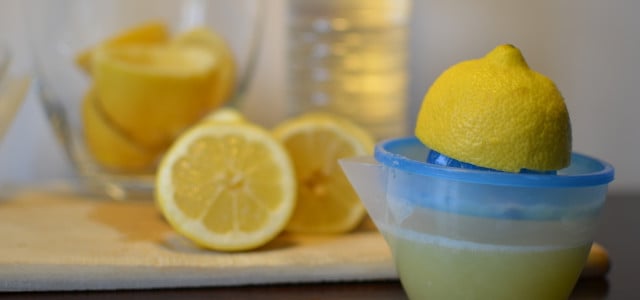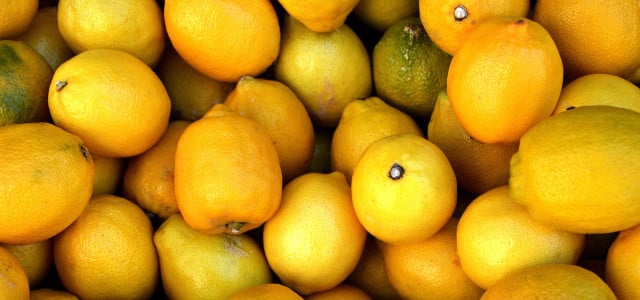Homemade all-purpose cleaners offer a great alternative to store-bought cleaning products. They take little effort to make and you can reduce your waste. In fact, you can make an all-natural cleaning product using only two ingredients: lemons and vinegar.
Many store-bought cleaning products contain chemicals that are harmful to both your health and the environment. Products promising to be “environmentally friendly,” “eco-safe,” or “green,” may be no exception to that. The United States Environmental Protection Agency (EPA) warns consumers to be careful in interpreting vague or generic claims on products such as those just mentioned. Making homemade all-purpose cleaner is not only a safe option to avoid any unnecessary health risks, it also doesn’t cost much in terms of effort or money.
Ingredients
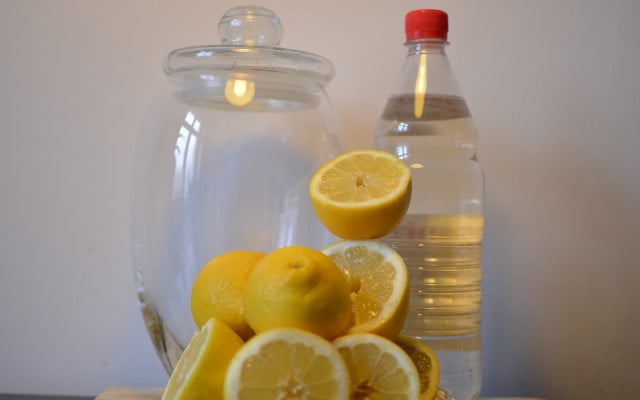
Vinegar not only helps you get rid of stains, it is also a natural disinfectant that can kill bacteria and is therefore very well suited for cleaning bathroom or kitchen surfaces. Adding citrus fruits will even out the strong vinegar scent that may be noticeable while applying the cleaner and will help you get rid of other smells. Moreover, the acid in the lemons also works as an effective stain remover.
Here’s what you need:
- 5 organic lemons
- 1/2 gallon white vinegar
Also have ready:
- lemon squeezer (available on Amazon**)
- large glass jar or pot with a lid
- old spray bottles or reusable glass spray bottle
- optionally: essential oils
Tip for making homemade cleaning products: You can also use oranges or peels to make your own all-purpose cleaner. Using oranges could be a good idea during Christmas time, for instance, because many seasonal recipes require the orange juice that you will have leftover.
How to Make Your Own All-Purpose Cleaner
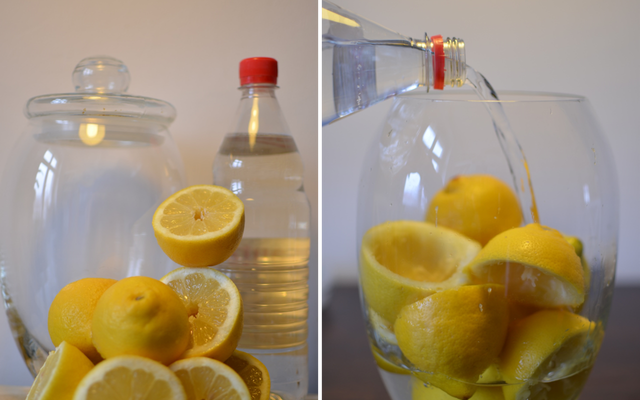


To make your own all-purpose cleaner, follow these simple steps:
- Squeeze the lemons and set aside the juice.
- Fill the lemon peels into the jar or pot. Do not use a plastic container for this.
- Pour in enough vinegar (about 3/4 of it) to cover the lemons.
- Wait 2-3 weeks. Add the rest of the vinegar once the lemon peels have soaked up some of the initial liquid that you added.
- Your homemade all-purpose cleaner is ready, when the vinegar takes on a slightly darker color and gives off a mild citrusy smell.
For the leftover juice, check out our recommendations down below.
Applying the Homemade All-Purpose Cleaner
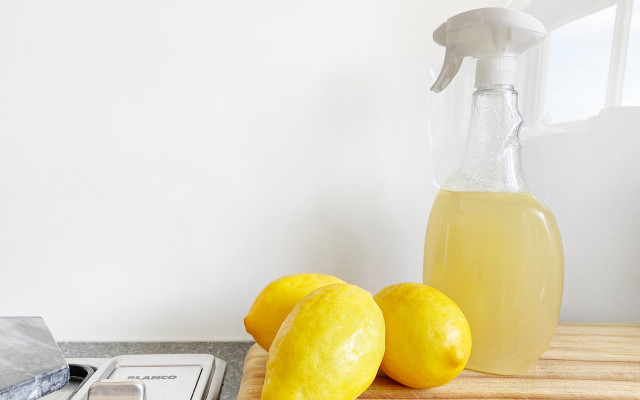


Use a kitchen towel or strainer to sift your all-purpose cleaner into another container for cleaning. To apply your finished cleaning product, you can for instance reuse an empty spray bottle. Just make sure there is no residue from chemical cleaning products left in it before you pour in your homemade all-purpose cleaner. If you can’t find an empty spray bottle or container, you can also buy reusable glass spray bottles on Amazon**.
This all-purpose cleaner is great for cleaning kitchen and bathroom surfaces and will help you get rid of dirt and grime. You can either spray it directly onto the surface or thin it with water.
Note: You can use the vinegar and lemon mixture on your stove, to clean your tiles, stainless steel appliances, linoleum surfaces and even your windows. It will help you get rid of grease, rust and limescale. You should not use it on natural stone flooring or countertops, such as those made out of marble, granite or quartz. Also be careful around rubber seals and silicone joints because the vinegar can cause them to degrade.
Using the Lemon Juice
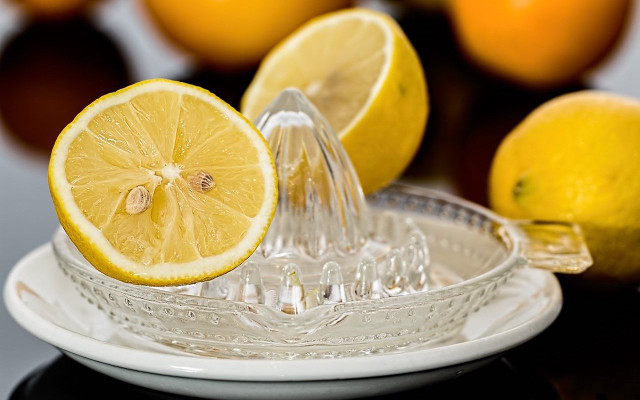


Lemon juice is one of those all-star ingredients that makes for many great self care products and recipes.
- Boost your immune system: lemons contain many important vitamins that can support your immune system.
- Hot lemon water: though vitamin C is very heat sensitive, you can still prepare hot lemon water in a way that won’t sacrifice the health benefits of the main ingredient.
- Sugaring Recipe: if you don’t feel like drinking lemon juice, you can also use it to make a natural body hair removal paste at home.
- Freeze lemon juice: if you’re running short on time, you can freeze lemon juice and then use it to make refreshing drinks later.
Tip: make your homemade all-purpose cleaner when you know you’ll have leftover lemon or orange peels, for instance after making juice for breakfast or when you’ve baked something with citrus fruits. That way you can make sure that you will use both the juice and the peels.
Tips for Buying and Storing Lemons
Citrus fruits are available in stores year-round, but they’re only local in some regions. Wherever you live, always make sure that you buy them when they’re in season and get the fruits with the shortest transport route. Also, we recommend buying organic products whenever possible.
- In the US, lemons are primarily grown in California, as well as a few other states. This means they don’t have to be shipped overseas but still, make sure you buy from the growers that are closest to you. It is best if you store them between 50 and 60 degrees F. Then you can keep them for up to 5 months.
- You can buy oranges grown within the US most of the year. They are in season in winter. You can keep them for a couple of days, but shouldn’t wait too long to eat them.
- Mexico is the leading supplier of limes to the US. Depending on where you live, there are longer ways of transport involved. There are different seasons for harvesting so you can buy them at all times and there is no real need to store them. They will last for about a month if you keep them in the fridge.
This article was translated from German to English by Sharon Hodge. You can view the original here: Allzweckreiniger selber machen: Einfache Anleitung mit nur 2 Zutaten.
Important Information regarding Health-related Topics.
** Links to retailers marked with ** or underlined orange are partially partner links: If you buy here, you actively support Utopia.org, because we will receive a small part of the sales proceeds. More info.Do you like this post?






